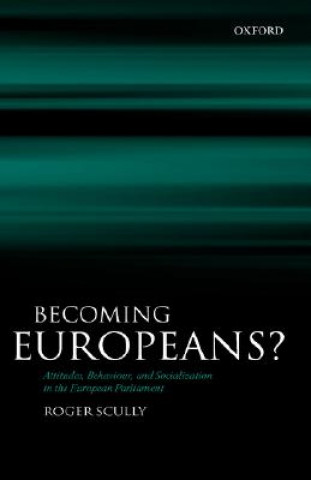
Code: 04531669
Becoming Europeans?
by Roger Scully
An almost universal point of agreement in contemporary political science is that 'institutions matter'. But the governing institutions of the European Union are widely presumed to matter more than most. A commonplace assumption ab ... more
- Language:
 English
English - Binding: Hardback
- Number of pages: 184
Publisher: Oxford University Press, 2005
- More about this

You might also like
-

Berserk Deluxe Volume 1
44.49 € -10 % -

Reckless
10.97 € -13 % -

Cry Baby Coloring Book
9.87 € -11 % -

Haunting Adeline
30.82 € -

Hunting Adeline
31.92 € -

Berserk Deluxe Volume 2
52.38 € -

Powerless
11.96 € -6 % -

The Official Stardew Valley Cookbook
23.34 € -18 % -

White Nights
3.58 € -22 % -

Berserk Deluxe Volume 4
46.69 € -6 % -

Berserk Deluxe Volume 3
48.98 € -1 % -

Berserk Deluxe Volume 5
50.58 € -

BALLAD OF SWORD & WINE QIANG JIN JIU V01
16.85 € -18 % -

The 48 Laws of Power
24.64 € -7 % -

Gravity Falls Journal 3
18.35 € -12 % -

No Longer Human
13.46 € -15 % -

Surrounded by Idiots
10.77 € -26 % -

Twisted Lies
9.77 € -23 % -

Berserk Deluxe Volume 6
51.28 € -

Atomic Habits
16.06 € -29 % -

Fourth Wing
10.27 € -19 %
Give this book as a present today
- Order book and choose Gift Order.
- We will send you book gift voucher at once. You can give it out to anyone.
- Book will be send to donee, nothing more to care about.
More about Becoming Europeans?
You get 165 loyalty points
 Book synopsis
Book synopsis
An almost universal point of agreement in contemporary political science is that 'institutions matter'. But the governing institutions of the European Union are widely presumed to matter more than most. A commonplace assumption about the EU is that those working within European institutions are subject to a pervasive tendency to become socialized into progressively more pro-integration attitudes and behaviours. The assumption has been integral to many accounts of European integration, and is also central to how scholars study individual EU institutions. However, the theoretical and empirical adequacy of this assumption has never been properly investigated. A serious study of whether political actors in the EU do tend to 'go native' or not - and why - is long overdue. This study examines this question in the context of an increasingly important EU institution, the European Parliament. The book integrates new theoretical arguments with a substantial amount of original empirical research. It develops a coherent understanding, based on simple rationalist principles, of when and why institutional socialization is effective. This theoretical argument explains the main empirical findings of the book. Drawing on several sources of evidence on MEPs' attitudes and behaviour, and deploying advanced empirical techniques, the empirical analysis shows the commonplace assumption about EU institutions to be false. European Parliamentarians do not become more pro-integration as they are socialized into the institution. The findings of the study generate some highly important conclusions. They indicate that institutional socialization of political elites should be given a much more limited and conditional role in understanding European integration than it is accorded in many accounts. They suggest that MEPs remain largely national politicians in their attitudes, loyalties, and much of their activities, and that traditional classifications of the European Parliament as a 'supra-national' institution are misleading. Finally, the study offers broader lessons about the circumstances in which institutions effectively socialize those working within them.
 Book details
Book details
Book category Books in English Society & social sciences Politics & government International relations
65.05 €
- Full title: Becoming Europeans?
- Subtitle: Attitudes, Behaviour, and Socialization in the European Parliament
- Author: Roger Scully
- Language:
 English
English - Binding: Hardback
- Number of pages: 184
- EAN: 9780199284320
- ISBN: 0199284326
- ID: 04531669
- Publisher: Oxford University Press
- Weight: 358 g
- Dimensions: 226 × 149 × 18 mm
- Date of publishing: 25. August 2005
Collection points Bratislava a 2642 dalších
Copyright ©2008-24 najlacnejsie-knihy.sk All rights reservedPrivacyCookies



 15549 collection points
15549 collection points Delivery 2.99 €
Delivery 2.99 € 02/210 210 99 (8-15.30h)
02/210 210 99 (8-15.30h)